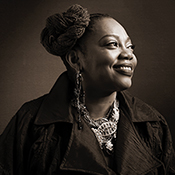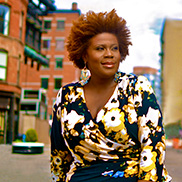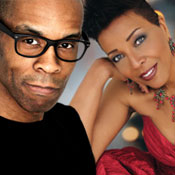
Capathia Jenkins Captures Aretha Franklin’s Spirit
David Lewellen
PUBLISHED
Tagged Under: Guest Artist, Pops
More than recreating Aretha Franklin’s greatest hits, Capathia Jenkins also wants to put the Queen of Soul in context.
Jenkins, a favorite singer on the orchestral pops circuit, will appear with the Milwaukee Symphony April 21-23 in a tribute to the legendary R&B diva. She, co-soloist Ryan Shaw, and three backup singers have performed the Aretha show all over the country, going back to before the pandemic began.
Backup singers set the scene for the church music environment that Franklin started in. And Shaw, whom Jenkins describes as “one of the best soul singers you’ll ever hear, ever,” helps place Franklin’s career in the context of singers like Otis Redding (who actually wrote and sang “Respect”) and Sam Cooke.
Even beyond musical elements, Jenkins wants to present “what was in the zeitgeist at the time.” That includes Franklin’s involvement in the civil rights movement of the 60s – work which Jenkins, in her own fashion, continues today.
“Every aspect of the business, not just the symphonic world, is largely white,” she says. “It just is. I’m unapologetically Black, and if you’re used to white space, whatever you think about Black people, you’re going to put it on me. And I have to create in that space, and be great and be kind.”
It’s not easy. If she’s in an orchestra rehearsal and has to ask for something, “I take a breath and ask for it in a way that’s non-threatening,” she says. “And that can be exhausting. But my responsibility is to make possibilities for other Black musicians. And one way to do that is to show up in a way that would make my parents proud.”
On a more organizational level, Jenkins is an original member of Black Theatre United, a group of Broadway artists who organized after George Floyd’s murder by police in 2020, who advocate for equity and inclusion in the theater world. The group met with producers and theater owners to produce written goals and guidelines for the industry because “you can only rely on the goodness of someone’s heart for a while,” she says.
Changing the norms of the business will take time. “It’s a marathon, not a sprint,” she says. Most of the artists who helped produce the new guidelines are showbiz veterans, and “we’re trying to relate to the young people who’d rather blow it up and burn it down. We all want to move faster, but we’re dealing with old systems.”
The classical music world is even whiter than the theater world, but most orchestras have realized that change is necessary. “Subscribers are literally dying,” Jenkins says, “and they have to get butts in seats.” Pops programs like hers help to bring in new audiences.
When the pandemic hit in March of 2020, “I was just this side of burned out, and I figured it would be a couple weeks off to rest and refresh,” she says. When weeks stretched into months, she began to feel signs of depression for the first time in her life. Eventually, she realized that part of what was missing was singing. She couldn’t perform for audiences, but just getting back into her practice routine felt “like a dark cloud was lifted. I realized how much singing is a part of who I am.”
But when she sings music strongly associated with another artist, it can put her in a delicate position. “No matter what Aretha was singing, you knew it was Aretha,” Jenkins says. “She was a singular talent – she was touched by God – but there are little things I can copy. Sometimes people will come up to me afterward and say, ‘You were channeling!’ I have to tap into Aretha’s essence, but for the most part, it’s Capathia.”
A good concert does give the audience something to think about, “but we also want to get them dancing,” she says. “We’ll see what Milwaukee does.” She laughs. “That’s not a challenge.”



